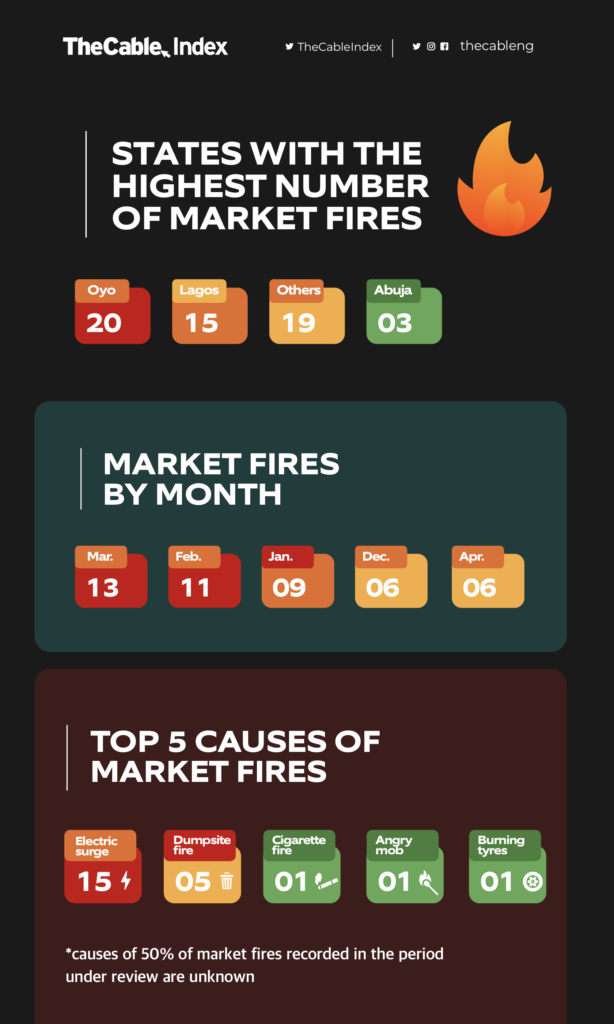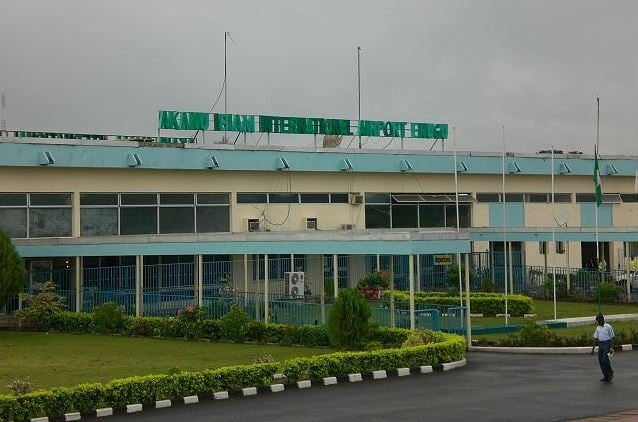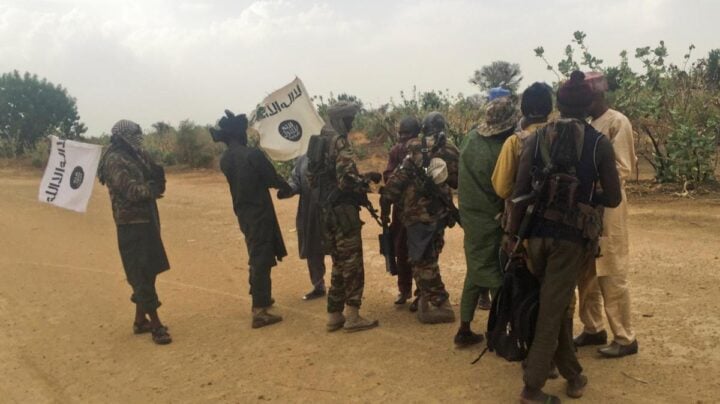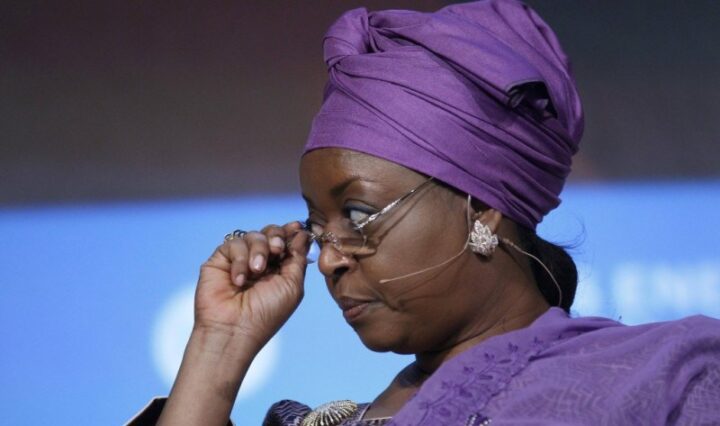For Modupe Yusuf, the day she “lost everything” to a market fire will forever be etched in her memory. From running a provisions store, she became a pepper seller overnight “to hold body and soul together”. The mother of four was preparing the family’s dinner in February 2021, when she received the call that shattered her dreams — her shop had been gutted by fire.
“I ran out of the house screaming. My daughter and I were able to get a bike that took us there,” she said.
“By the time we got there, everything was gone. There was nothing left, all burnt black. I started selling pepper around June to cater for my family. The hunger was much. I just had to start another business before we die of hunger.”
Esther Adekanbi endured a similar experience in May 2021 when her shop got burnt at Kairo Market, Oshodi, Lagos. She went from running a sustainable business to buying goods on credit from suppliers and holding on firmly to the “grace of God”.
Advertisement
“It took about two months for the shops to be rebuilt. The Iyaloja and some other people from the government came and talked about compensating us. We were asked to write our names, what we lost and the cost but till now, we haven’t heard anything from them,” she said.
As a result of these frequent fire outbreaks, means of livelihood are being threatened while billions of naira worth of goods are destroyed, with many rendered jobless and hopeless.
Between November 2020 and August 2021, over 50 fire outbreaks were recorded in different markets across Nigeria. From Lagos to Ibadan, Abuja to Sokoto and Edo, traders watched helplessly as their toils over the years were burnt down in hours.
Advertisement
| S/N | DATE | STATE | CAUSE |
|---|---|---|---|
| 1 | November 07 | Oyo | Set on fire by angry mob |
| 2 | November 20 | Oyo | Cigarette fire |
| 3 | November 25 | Benue | Unknown |
| 4 | December 2 | Osun | Unknown |
| 5 | December 15 | Lagos | Unknown |
| 6 | December 19 | Lagos | Unknown |
| 7 | December 24 | Lagos | Unknown |
| 8 | December 27 | Lagos | Unknown |
| 9 | December 28 | Oyo | Electrical surge |
| 10 | January 11 | Abuja | Unknown |
| 11 | January 16 | Sokoto | Unknown |
| 12 | January 18 | Lagos | Electrical surge |
| 13 | January 19 | Oyo | Dumpsite fire |
| 14 | January 22 | Oyo | Dumpsite fire |
| 15 | January 24 | Oyo | Electrical surge |
| 16 | January 25 | Lagos | Unknown |
| 17 | January 25 | Oyo | Electrical surge |
| 18 | January 26 | Lagos | Electrical surge |
| 19 | February 3 | Oyo | Burnt tyres |
| 20 | February 4 | Abuja | Electrical surge |
| 21 | February 9 | Lagos | Unknown |
| 22 | February 9 | Lagos | Unknown |
| 23 | February 13 | Bauchi | Electrical surge |
| 24 | February 13 | Oyo | Bush fire |
| 25 | February 16 | Oyo | Electrical surge |
| 26 | February 21 | Oyo | Electrical surge |
| 27 | February 21 | Oyo | Burning sawdust |
| 28 | February 24 | Port Harcourt | Unknown |
| 29 | February 28 | Edo | Unknown |
| 30 | March 2 | Oyo | Dumpsite fire |
| 31 | March 3 | Oyo | Electrical surge |
| 32 | March 5 | Anambra | Unknown |
| 33 | March 6 | Lagos | Unknown |
| 34 | March 10 | Anambra | Unknown |
| 35 | March 11 | Lagos | Unknown |
| 36 | March 16 | Lagos | Unknown |
| 37 | March 17 | Oyo | Electrical surge |
| 38 | March 21 | Zamfara | Electrical surge |
| 39 | March 22 | Katsina | Unknown |
| 40 | March 27 | Yobe | Unknown |
| 41 | March 27 | Oyo | Unknown |
| 42 | March 29 | Oyo | Unknown |
| 43 | April 2 | Oyo | Unknown |
| 44 | April 2 | Katsina | Unknown |
| 45 | April 3 | Oyo | Electrical surge |
| 46 | April 9 | Jigawa | Dumpsite fire |
| 47 | April 10 | Oyo | Unknown |
| 48 | April 12 | Lagos | Unknown |
| 49 | May 6 | Lagos | Explosives/accelerants |
| 50 | May 10 | Osun | Electrical surge |
| 51 | May 26 | Delta | Unknown |
| 52 | May 30 | Lagos | Electrical surge |
| 53 | June 1 | Bauchi | Unknown |
| 54 | June 2 | Sokoto | Unknown |
| 55 | June 3 | Kwara | Dumpsite fire |
| 56 | July 6 | Abuja | Generator explosion |
| 57 | August 2 | Port Harcourt | Unknown |
Media reports studied showed that from November 2020, most of the fire incidents happened in the south-west region of the country. TheCable found that Oyo recorded the highest number of market fires with 20 incidents, followed by Lagos with 15 incidents and Abuja had three cases.
During the period under review, not less than 50 fire outbreaks were recorded in different markets with more than 10,000 shops razed.
TheCable found that the highest number of market fires were recorded in February and March 2021, with 11 and 13 cases respectively, while the least was recorded in November — three cases.
FREQUENCY OF FIRE OUTBREAKS PER MONTH
Advertisement
|
S/N |
Months |
Frequency |
|
1 Advertisement |
November |
3 Advertisement |
|
2 |
December Advertisement |
6 |
|
3 Advertisement |
January |
9 |
|
4 |
February |
11 |
|
5 |
March |
13 |
|
6 |
April |
6 |
|
7 |
May |
4 |
|
8 |
June |
3 |
|
9 |
July |
1 |
|
10 |
August |
1 |
|
Total |
57 |
WHAT’S CAUSING THESE MARKET FIRES?
Fire outbreaks are caused by several factors which could be either natural or human activities. The majority of market fires were found to have been caused by electric surges while very few were as a result of burning refuse close to the markets.
A good number of the fire incidents happened at night which led to late discovery. Data also showed that some traders lost their lives to the infernos while some others sustained injuries while trying to salvage their goods.
Amodu Sheriff, head of public education, Lagos State Fire Service, said the rampancy of fire incidents in markets is worrying.
He listed carelessness as the major cause of market fires and attributed 80 percent of the incidents to human error.
“We are worried and concerned because while other fire statistics are dropping, I am afraid that of markets are not. We’ve witnessed 25.8% of the fire outbreak in general in the last two years,” Sheriff said.
“Most of the market fires, if you go by the record, they happen overnight and that has always been the case. Most of it has been out of carelessness or negligence.”
Adewuyi Moshood, head of fire service in Oyo state, also attributed the causes of market fires to negligence but pointed out the haphazard arrangement of markets as another factor.
“There is no proper arrangement in our markets in Nigeria. If you look at our markets, we have a variety of products being sold. But the market is not segmented to accommodate the risks involved,” he said.
“Secondly, majority of our markets that have initial plans are being altered. There are standards design for our markets including things like access roads. The majority of the access roads have already been blocked with the display of market materials.”
Moshood also called for better management of the fire service and increased investment in safety by the government.
He said: “If there is a fire outbreak now, there’s sometimes no adequate source of water for fire service trucks. In the olden days, we had fire hydrants that were functioning in the communities.”
HOW PROMPT/EFFECTIVE ARE RESPONSES TO FIRE EMERGENCIES?
Some of the fire incidents in the past 10 months were avoidable and could have been prevented. Delayed response from fire service sometimes aggravates issues but in cases where there is a timely response, some of the markets are not easily accessible, making it difficult for rescue teams to get to affected areas during emergencies.
For instance, at the Namu central Yam market in Plateau, eyewitnesses reportedly tried to put out the fire with sand as the community had an acute water shortage. But by the time the fire was brought under control, most of the shops had been destroyed by the inferno.
Tayo Oshoteku, a tyre dealer who lost his shop at the auto parts market in Agodi-Gate, Ibadan, Oyo state, said some sections of the market would have survived the inferno if the fire service had responded promptly.
Some other traders said the firefighters could not access the market in time due to the abandoned vehicles and motor parts blocking the most affected areas.
The Oyo fire service boss agreed that poor response is among the challenges affecting the service, but he also blamed the traders for making markets inaccessible.
“What happened at Araromi market is lack of proper accessibility because fire service was not allowed to enter the place. Fire service was there promptly but there was no accessibility to where the fire was burning. From where the fire service truck was parked to where the fire was burning is over five lengths of road and the length of the road is 75 metres,” Moshood said.
He also said the fire service is not adequately equipped to perform its duties, which in turn, affects the effective delivery of service.
“Poor response is part of the factors but what we need to know is that in the country, fire service is not well cared for compared to how we care for security,” he said.
“There is insufficient equipment, lack of proper distribution of fire stations within the communities, insufficient establishment of fire stations.”
On his part, the Lagos fire service head of public education, said a lot of factors contribute to how fast firefighters respond to an emergency. He told TheCable that responding to emergency calls is also dependent on the information given by the caller.
Sheriff listed call time, address, traffic, accessibility of the road as factors that determine response.
“It’s a function of so many things. When you look at the factors responsible for emergency response time, you look at who discovered the emergency? At what time did the person place the call? Which information did he relay when he called? Does that person know what to do to arrest the emergency?
“In some cases, you would have made a call, and addresses are similar in Lagos. For example, there are three areas called Ajegunle in Lagos. If you are not specific, you have thrown the responder into confusion. Then we also look at the traffic situation which is another major problem in Lagos.
“Another thing is some roads are not easily accessible and you also look at truck barriers, street gating and also the parking. Some streets are narrow.”
HOW CAN THESE ISSUES BE ADDRESSED?
To alleviate the effect of market fires on traders, state governments sometimes promise monetary compensation and/or pledge to rebuild the markets — but fire service officials said issues affecting their ability to adequately combat fires and the enforcement of safety regulations must also be prioritised.
Moshood asked the government to give necessary backup resources to firefighters to enable them to function well. He also called for the enforcement of safety standards in major markets and houses.
He noted the need for the provision of more fire service trucks, the establishment of additional fire stations across states, and the provision of functioning fire hydrants for quick access in market areas. He also emphasised the importance of safety awareness in markets.
On his part, Sheriff said traders need to be, at all times, safety-conscious. He advised that electrical appliances, when not in use, should be unplugged from sockets.
“Even if you switch off from the socket, you need to unplug them, that’s when you cannot expect any surge,” he said.
He called for more sensitisation in the markets, saying the best way to fight fire is to prevent it.
“We are talking to market leaders and stakeholders in the market sector. Also, these markets have to be segregated and well arranged. You can’t have a mixed market. You can’t have people selling textiles among those selling tomatoes.”
For prompt intervention, he enjoined Nigerians to familiarise themselves with the emergency toll numbers of each state.







